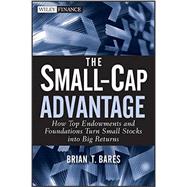
The Small-Cap Advantage How Top Endowments and Foundations Turn Small Stocks into Big Returns
by Bares, BrianBuy New
Rent Book
Used Book
We're Sorry
Sold Out
eBook
We're Sorry
Not Available
This item is being sold by an Individual Seller and will not ship from the Online Bookstore's warehouse. The Seller must confirm the order within two business days. If the Seller refuses to sell or fails to confirm within this time frame, then the order is cancelled.
Please be sure to read the Description offered by the Seller.
Summary
Author Biography
Brian T. Bares, CFA, is a research analyst with Bares Capital Management, Inc. He founded the firm in 2000 with the belief that concentrated portfolios of inefficiently priced small companies could lead to high relative compounding. His firm manages the institutional portfolios of small-cap and micro-cap common stocks in long-only, replicated separate accounts. Mr. Bares began his career by working his way up from the bottom. From compliance and operations, to trading and portfolio management, he garnered experience in nearly all aspects of running a boutique small-cap management company before starting his own company. He graduated from the University of Nebraska with a degree in mathematics. His investment philosophy and strategy have been profiled in Value Investor Insight and the Manual of Ideas: Portfolio Manager's Review. Mr. Bares holds the Chartered Financial Analyst designation and is a member of the CFA Society of Austin. He resides in Austin, Texas, with his wife and two sons.
Table of Contents
| Introduction | |
| Acknowledgments | |
| The Small-Cap Advantage | |
| Two Sources of Outperformance | |
| Small-Cap Definitions | |
| The Outperformance of Small-Cap Stocks | |
| Outperformance within the Small-Cap Space | |
| Chapter Summary | |
| Small-Cap Disadvantages | |
| Research | |
| Trading | |
| The Small-Cap Graveyard and Reverse Survivorship Bias | |
| Capping Assets | |
| Chapter Summary | |
| Small-Cap Investment Philosophy and Process | |
| Institutional Approach | |
| Passive and Enhanced Indexing in Small-Cap Stocks | |
| Active Management in Small-Cap Stocks | |
| Chapter Summary | |
| Small-Cap Manager Organization | |
| Creating Value for the Manager | |
| Launching a Small-Cap Firm | |
| Investment Team | |
| Chapter Summary | |
| The Fundraising Process | |
| General Marketing Strategy | |
| Institutional Clients | |
| Foundations and Endowments | |
| Consulting Firms | |
| Pension Plans | |
| High Net-Worth Individuals | |
| Wrap Fee and other Sub-Advisory Relationships | |
| Databases | |
| Third-Party Marketers | |
| The Chicken-and-Egg Problem | |
| Chapter Summary | |
| Fees, Agency Issues, and Other Performance Drags | |
| Common Performance Drags | |
| Frictional Costs in Small Caps | |
| Institution-Manager Agency Issues | |
| Agency Issues in Trading | |
| Benchmark Tyranny | |
| Commingled and Separate Accounts | |
| Chapter Summary | |
| Small-Cap Managers and the Endowment Model | |
| The Endowment-Model Approach to Small Caps | |
| Finding an Edge | |
| Funding Smaller Managers | |
| Funding Emerging Managers | |
| Finding Emerging Managers | |
| Chapter Summary | |
| Evaluating Small-Cap Managers | |
| Institutional Due Diligence Teams | |
| Assessing Manager Risk | |
| Assessing Investment Philosophy | |
| Analyzing a Manager's Process | |
| Evaluating Firm Principals | |
| Assessing Manager Operations | |
| Contributions and Withdrawals | |
| Chapter Summary | |
| Final Thoughts | |
| Notes | |
| About the Author | |
| Index | |
| Table of Contents provided by Publisher. All Rights Reserved. |
An electronic version of this book is available through VitalSource.
This book is viewable on PC, Mac, iPhone, iPad, iPod Touch, and most smartphones.
By purchasing, you will be able to view this book online, as well as download it, for the chosen number of days.
A downloadable version of this book is available through the eCampus Reader or compatible Adobe readers.
Applications are available on iOS, Android, PC, Mac, and Windows Mobile platforms.
Please view the compatibility matrix prior to purchase.
